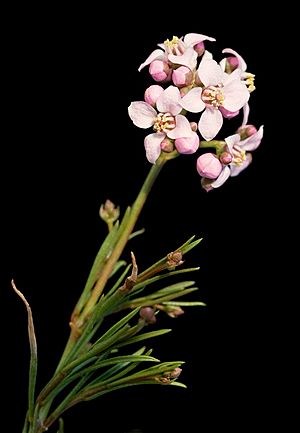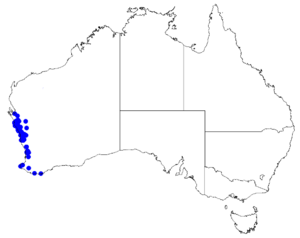Granite boronia facts for kids
Quick facts for kids Granite boronia |
|
|---|---|
 |
|
| A Granite Boronia plant at the Australian National Botanic Gardens | |
| Scientific classification | |
 |
|
| Where Granite Boronia grows in Australia |
The Boronia cymosa, also known as granite boronia, is a type of plant. It belongs to the citrus family called Rutaceae. This plant is only found in the south-west part of Western Australia.
Granite boronia is a shrub that stands upright. It has thin, almost round leaves and groups of small, pink flowers. These flowers have four petals and grow on branched stems.
Contents
What Granite Boronia Looks Like
Granite boronia is a shrub that usually grows to be about 0.2 to 0.6 metres (0.7 to 2 feet) tall. It has thin, straight branches. Its leaves are narrow and look like small cylinders. They are about 12 to 25 millimetres (0.5 to 1 inch) long. You can often see them grouped together near the ends of the branches.
The flowers are quite small. They grow in groups on stems that branch out. Each group of flowers has a long main stalk, and each flower sits on a short stem. The plant has four short, wide sepals. It also has four pink petals, which are about 8 millimetres (0.3 inches) long. Inside the flower, there are eight fuzzy stamens. This plant usually flowers from May to November.
How Granite Boronia Got Its Name
The plant Boronia cymosa was officially described for the first time in 1837. This description was made by a scientist named Stephan Endlicher. He published his findings in a book that listed plants collected in Western Australia.
Where Granite Boronia Lives
Granite boronia grows in several areas of Western Australia. You can find it on rocky hillsides and sandy plains. It often grows on granite outcrops, which are large areas of rock sticking out of the ground.
This plant lives in different natural areas called biogeographic regions. These include the Avon Wheatbelt, Carnarvon, Geraldton Sandplains, Jarrah Forest, Swan Coastal Plain, and Yalgoo regions.
Protecting Granite Boronia
The Government of Western Australia's Department of Parks and Wildlife has looked at the granite boronia. They have listed it as "not threatened." This means the plant is not currently in danger of disappearing.

